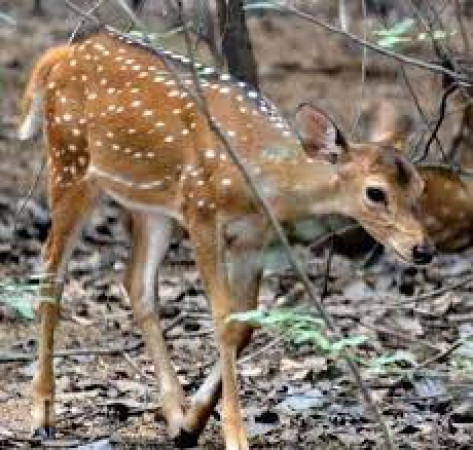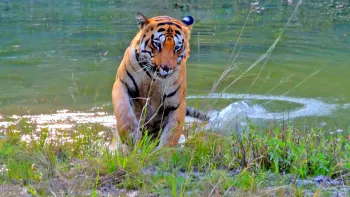Rangapahar Reserve Forest Travel Guide
Rangapahar Reserve Forest is a hidden gem nestled in the northeastern state of Nagaland, India. This biodiverse region is known for its lush greenery, exotic wildlife, and serene atmosphere. Established in 1920, the reserve forest covers an area of 49.4 square kilometers and is a paradise for nature lovers and adventure enthusiasts. The forest is home to a variety of flora and fauna, including rare orchids, wild elephants, leopards, and several species of birds.Top Attractions in Rangapahar Reserve Forest
- Exploring the Botanical Garden
- Wildlife Safari to spot elephants and leopards
- Trekking through the lush green trails
- Visiting the Rangapahar Zoo
Rangapahar Reserve Forest is Famous for
Its diverse wildlife and lush greenery make Rangapahar Reserve Forest famous among nature enthusiasts and wildlife photographers.Top Attractions in Rangapahar Reserve Forest
- Exploring the Botanical Garden
- Wildlife Safari to spot elephants and leopards
- Trekking through the lush green trails
- Visiting the Rangapahar Zoo
What's Great about Travelling to Rangapahar Reserve Forest?
- Perfect destination for nature lovers
- Opportunity to spot rare wildlife
- Serene and peaceful environment
What's Not So Great about Travelling Rangapahar Reserve Forest?
- Limited accommodation options
- Remote location
- Weather can be unpredictable
Travel Tips for Rangapahar Reserve Forest
- Obtain necessary permits for entry
- Wear comfortable clothing and sturdy shoes for trekking
- Respect the wildlife and natural surroundings
Important Rangapahar Reserve Forest trip information
- Ideal Duration: 2-3 days
- Best Time to Visit: October to April
- Nearby Airports and Railway Stations: Dimapur Airport and Dimapur Railway Station
Per Person
17,800
*EXCLUDING APPLICABLE TAXES Per Person
13,000
*EXCLUDING APPLICABLE TAXES Per Person
21,000
*EXCLUDING APPLICABLE TAXES Per Person
15,000
*EXCLUDING APPLICABLE TAXES FAQ's on Rangapahar Reserve Forest
Q1: What is the best time to visit Rangapahar Reserve Forest?
The best time to visit Rangapahar Reserve Forest is during the winter months from November to February when the weather is pleasant and ideal for exploring the lush greenery and wildlife. Avoid the monsoon season from June to September as heavy rainfall can make trekking and outdoor activities challenging.
Q2: Do I need a visa to travel to Rangapahar Reserve Forest?
Visitors to Rangapahar Reserve Forest may need a visa depending on their nationality. It is advisable to check with the Indian embassy or consulate in your country for specific visa requirements. Some nationalities may be eligible for visa-on-arrival or e-visa facilities. Make sure to have a valid passport with at least six months of validity.
Q3: What are the must-visit attractions in Rangapahar Reserve Forest?
Rangapahar Reserve Forest offers stunning natural beauty and diverse wildlife. Must-visit attractions include the Rangapahar Wildlife Sanctuary, Japfu Peak for trekking, Dzüko Valley for its breathtaking views, and Khonoma Village for its rich cultural heritage. Wildlife enthusiasts can also explore the flora and fauna in the reserve.
Q4: Is Rangapahar Reserve Forest a safe place to travel?
Rangapahar Reserve Forest is generally safe for tourists, but it is recommended to take necessary precautions like avoiding isolated areas, staying on designated paths during treks, and following guidelines provided by local authorities. Be cautious of wildlife encounters and respect the natural habitat.
Q5: What is the local currency in Rangapahar Reserve Forest and can I use credit cards?
The local currency in Rangapahar Reserve Forest is the Indian Rupee (INR). While credit cards are accepted in major establishments in urban areas, it is advisable to carry cash for smaller purchases and in rural areas. ATMs are available in towns for convenient cash withdrawals.
Q6: What is the local cuisine like in Rangapahar Reserve Forest?
offers a mix of traditional Naga cuisine with its unique flavors and spices. Try local delicacies like smoked pork, bamboo shoot curry, akhuni (fermented soybean), and rice beer. Vegetarians can enjoy dishes like aloo pitika (mashed potatoes) and various leafy greens. Be open to trying new flavors and textures.
Q7: What transportation options are available in Rangapahar Reserve Forest?
Transportation options in Rangapahar Reserve Forest include buses, taxis, and private cars for hire. Public transport may be limited, so it is advisable to arrange for transportation in advance for sightseeing or wildlife safaris. Hiring a local guide or driver can enhance your travel experience and help navigate the area.
Q8: Are there any cultural norms or etiquette I should be aware of when visiting Rangapahar Reserve Forest?
Respecting the local culture is essential when visiting Rangapahar Reserve Forest. Dress modestly, especially when visiting religious sites or tribal villages. Seek permission before taking photographs of locals. Avoid littering in natural areas and follow eco-friendly practices. Greet people with a smile and be open to learning about the traditions and customs of the indigenous tribes.
Q9: I am a travel agent. How can I buy travel leads of Rangapahar Reserve Forest?
Register yourself as a travel agent at agents.tripclap.com and then you can buy travel leads to Rangapahar Reserve Forest once your account is approved. For more details contact our support team at +91-8069186564 or support@tripclap.com



